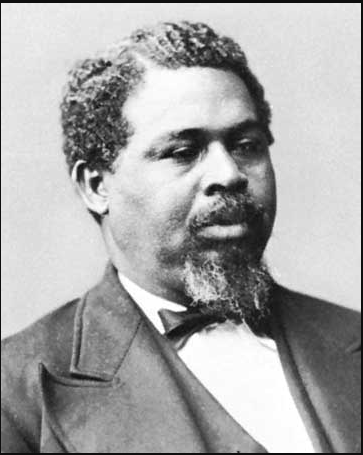Early in the morning of May 13, 1862, a Confederate ship sailed through Charlestown Harbor straight into the Union blockade. The USS Onward spotting the vessel was about to fire when suddenly a white flag appeared from the deck held by Robert Smalls, a slave from South Carolina. Smalls, originally a slave from Charleston, would eventually become a war hero and outspoken Republican politician as well as a US Congressman and State Senator.
His story, however, began quietly. Born behind the house of his owner in Beaufort, South Carolina in April of 1839, Smalls’ life was that of a typical southern slave. He worked in the fields alongside other slaves, becoming a favorite of his owner where he gained privileges over other slaves. Notwithstanding his special treatment, he saw the horrors of slavery and became defiant. As a result, he was a frequent visitor to the Beaufort jail. His mother pushed for him to get a job in the city to keep him away from the poor treatment of slaves.
Smalls earned a job on the USS Planter, where he learned information that would be invaluable to his escape. On the ship, Smalls could view the Union blockade north, a sign he would come to understand as freedom. Knowing the Union accepted any runaway slave, Smalls formulated his getaway plan in the back of his mind. When the war broke out, Smalls’ job was to transport soldiers and military necessities on his boat. He and other slaves plotted their escape along with their families using the vessel. Smalls had sailed extensively in the harbor and had learned much of the captain’s duties along with knowledge of the sea. So, on the morning of May 13, 1862, at about 3 a.m., Smalls and other slave crew members boarded the USS Planter wearing crew uniforms so as to avoid suspicion. Smalls stole the captain’s uniform. While commanding the ship, he imitated his captain’s gestures and movements to fool any Confederate onlookers as they sailed through the water past successive Confederate forts. The ship stopped to pick up their families and continued right into the Union Blockade, where Smalls lowered the Confederate flag and raised a white flag in surrender and earned his freedom.
His extensive knowledge of the Charleston Harbor was invaluable to the Union’s war effort. He updated the Union navy about ships and troops posted along the harbor giving them a considerable edge in navy battles. He told Admiral Samuel DuPont that the fortifications were down at Coles Island allowing the Union forces to capture the location just a few days after Smalls’ escape. Later Smalls became a fierce advocate for allowing black men to fight for the Union, successfully lobbying President Abraham Lincoln for the opportunity.
After the Civil War, Smalls started his own business in the South assisting freedmen who had no education or jobs. His amazing story and success helped jumpstart his political career as a loyal Republican. In a letter he wrote to a Senator he stated, “I never lose sight of the fact that had it not been for the Republican Party, I never would have been an office-holder of any kind—from 1862 to the present.” Describing his party, he remarked that it was “the party of Lincoln…which unshackled the necks of four million human beings.” He became a US Congressman for South Carolina in 1868, fighting for civil rights in Congress. Unfortunately, enemies succeeded in convicting him of bribery, forcing him from his seat in Congress. Though his political career came to an end, Smalls continued to fight for equal rights and Republican values. His legacy as an advocate for the American Way lives on to this day.




